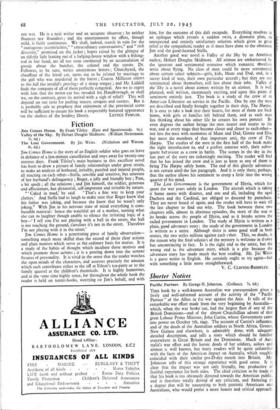Fiction
dim Comes Home is the story of an English soldier who goes on leave in defiance of a last-minute cancellation and stays away for twenty-one anxious days. Frank Tilsley's main business in this excellent novel has been to draw a picture of family relationships under great strain, to make an analysis of bothered, irritable, puzzled and injured people, all reacting on each other—Stella sensible and sensitive, but unaware of her husband's delinquency ; Roger, a jolly and friendly boy; Pam, a bit spoilt ; all the relations ; and Jim himself, the soldier, generous and affectionate, but dictatorial, self-important and irritable by nature.
" Caked in mud,' he said. That's a fine way to keep your clothes.' And Stella had to laugh to make sure that Roger knew that his father was joking, and because she knew that he wasn't only joking." With Jim in his nervous state of mind everything is com- bustible material : hence the watchful art of a mother, turning what she can to laughter though unable to silence the irritating logic of a boy—' I tell you I'm not playing with a ball in the street, the ball is not touching the ground, therefore it's not in the street. Therefore I'm not playing with it in the street.'
dim Comes Home is a penetrating piece of family observation— something much more skilful than the record of those clear actions and plain motives which serve as the ordinary basis for stories. It is a study of the habits of thought which incubate those motives and which promote those actions ; it is a peering down into the remote fissures of personality. It is vivid in the sense that the reader watches the open minds of the characters, and assesses precisely the amount which each contributes either to the tiff at Eileen's tea-party or to the family quarrel at the children's theatricals. It is highly humorous, and at the Fame time highly tense,, for throughout the whole book the reader is held on tenter-hooks, worrying on Jim's behalf, and with
him, for the outcome of this daft escapade. Everything resolves in an epilogue which reveals a sudden twist, a dramatic plan, an unexpected and entirely satisfactory solution which gives as great relief to the sympathetic reader as it must have done to the obstinate Jim and the good-hearted Stella.
Another good war novel is Valley of the Sky by an American author, Hobart Douglas Skidmore. All airmen are embarrassed by the ignorant and sentimental nonsense which romantic fitivelists write about flying. No class of men could be more sentimental about certain select subjects—girls, kids, Mum and Dad, and, in a secret kind of way, their own particular aircraft ; but they are not sentimental about themselves, still less about their jobs. Valley of the Sky is a novel about airmen written by an airman. It is well planned, well written, enormously exciting, and upon this point of sentiment entirely just. The book is a study of the crew of an American Liberator on service in the Pacific. One by one the men are described and finally brought together in their ship, The Harpie. It is easy to take a look into their hearts, for most of them are back home, with girls or families left behind them, and as each man lies thinking about his other life he creates his own portrait. By even degrees the author brings the men nearer and nearer to the war, and at every stage they become closer and closer to each other— not less the men with memories of Mum and Dad, Ginnie and Elsa, but more the members of that important unit, the crew of The Harpie. The studies of the men in the first half of the book make the right introduction to, and a perfect contrast with, their subse- quent behaviour as a crew in battle. The scenes in the sky in the last part of the story are sickeningly exciting. The reader will find that he has joined the crew and is just as keen as any of them to bring The Harpie safely home. The end of this ghastly adventure is not certain until the last paragraph. And it is only there; perhaps, that the author allows his sentiment to creep a little into the wrong quarter of his mind.
The Lost Government is the government of Illyria, which has spent the war years safely in London. The aircraft which is taking it home meets with disaster, and one and all, including the aged Duchess and the Cardinal, are obliged to descend by parachute. They are never heard of again, and the reader will have to wait till the last chapter to find out why. The book between these two chapters tells, almost in alternate episodes, the story of the war as its breaks across the people of Myna, and as it breaks across the exiled government in London. The study of Illyria is written as a plain, gqod adventure story: the study of the government in London is written as a satire. Although there is some good stuff in both stories, the two styles militate against each ether. This, no doubt, is the reason why the final solutio i of the mystery is welcome in theory but unconvincing in fact. It is the right end to the satire, but the wrong end to the adventure story, which is a pity because the adventure story has made much the best teading. Mr. Jiri Weiss is a guest writer in English. He certainly ought to try again—but with something a little more straightforward.
V. C. - CLINTON-BADDELEY.


























 Previous page
Previous page